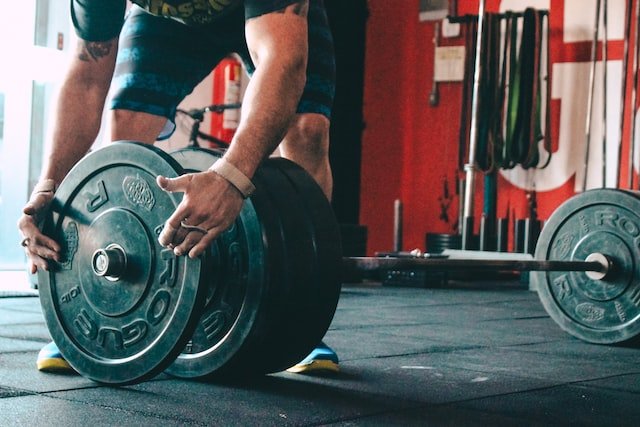
Why Do I Lose My Mind Muscle Connection When I Lift Heavier Weights? Find Out Here
When you lift heavier weights, it taxes your muscles more and makes it difficult to maintain engagement.
It may seem like your arms or legs are working harder than they should be, and it can be tough to maintain a stable posture.
But what’s really going on? Why does the mind-muscle connection disappear when we lift heavier weights?
In this article, we’ll take a look at what causes this and explore some possible solutions.
By understanding why the mind-muscle connection is lost when we lift heavier weights, we can work to improve it and make our workouts more effective.
Why do I lose my mind-muscle connection when I lift heavier weights?
There are a few reasons why the mind-muscle connection might be lost when we lift heavier weights. First, when we lift heavy weights, our body’s natural tendency is to recruit more muscles to help with the lift. This means that our focus is divided between multiple muscles, making it difficult to keep our mind on just one muscle group. Another reason why the mind-muscle connection might be lost when we lift heavier weights is that our body is trying to protect itself from injury. When we lift heavy weights, our body perceives this as a threat and will tighten up in order to protect itself. This can lead to tension in our muscles, which can make it difficult to focus on the muscle group we’re trying to train. Finally, when we lift heavy weights, our body releases hormones that can interfere with our ability to focus. When we lift heavy weights, our body releases adrenaline and cortisol, which are hormones that are designed to help us deal with stress. However, these hormones can also lead to feelings of anxiety and can make it difficult to focus on our muscles.
What is the mind-muscle connection?
The mind-muscle connection is the link between our brain and our muscles. When we have a strong mind-muscle connection, we’re able to focus on the muscle group we’re trying to train and better activate the muscles we’re working.
Your central nervous system (CNS) is responsible for the mind-muscle connection. The CNS is made up of the brain and the spinal cord, and it is responsible for sending signals to our muscles. When we want to move a muscle, the CNS sends a signal to that muscle telling it to contract.
The mind-muscle connection is what allows us to focus on our muscles and better activate them. When we have a strong mind-muscle connection, we’re able to better focus on the muscle group we’re trying to train.
However, when it comes to lifting heavier weights, some people find they lose their mind-muscle connection and struggle to focus on the muscle group they’re trying to train.
Let’s look at the potential reasons why you lose your mind-muscle connection and what you can do to improve it.
Concentrate on contraction
When you lose your mind-muscle connection, one of the best things you can do is to concentrate on the contraction of the muscle group you’re trying to train.
The mind-muscle connection is the link between our brain and our muscles. When we have a strong mind-muscle connection, we’re able to focus on the muscle group we’re trying to train and better activate the muscles we’re working.
What you have to do with the muscle is feel it and sense it…while it may be difficult at first, with enough practice, you’ll get the hang of it in no time.
When you focus your awareness on something, the signals adapt and create stronger bonds. If you train your awareness, it will only get better with time.

Are you new to training?
If you’re new to weightlifting, it’s natural that you might not have a strong mind-muscle connection yet.
A strong mind-muscle connection allows us to focus on the group of muscles we’re trying to work out, which then enables us to activate those muscles more effectively.
If you’re new to weightlifting, your focus might be more on just trying to get the lift right, rather than on specifically contracting the muscle group you’re trying to train. This is perfectly normal and is something that will improve with time and practice.
As you become more comfortable with the lifts, you’ll be able to focus more on contracting the muscles you’re trying to work, and less on just getting the lift right.
Related: Why do some people vomit when lifting heavy weights?
What are your goals?
Your goals will also play a role in how strong your mind-muscle connection is.
If your goal is to just get the lift right, then your focus will be on that, rather than on specifically contracting the muscle group you’re trying to train.
However, if your goal is to focus on contracting the muscle group you’re trying to work, then your mind-muscle connection will be stronger.
It’s important to have a clear goal in mind when you’re weightlifting. If your goal is to just get the lift right, then your focus will be on that.
If you are looking for hypertrophy (muscle growth) then you should focus on the mind-muscle connection, and maybe look to change the way in which you lift by doing negatives, and time under tension (more on this shortly).
Whereas if you are looking to build strength, your focus should be on getting the lift right.
Lifting heavier weights
Another reason why you might lose your mind-muscle connection when lifting heavier weights is that your body is trying to protect itself from injury.
When we lift heavy weights, our body perceives this as a threat and will tighten up in order to protect itself. This can lead to us losing our mind-muscle connection as our focus is divided between protecting ourselves from injury and trying to keep our mind on the muscle group we’re working.
One way to overcome this is to focus on your breathing. When we focus on our breath, it helps to relax our body and mind, which then allows us to better focus on the muscle group we’re trying to train.
Another way to overcome this is to use a weight that is heavy enough to challenge you, but not so heavy that your form starts to suffer.
When going that bit heavier or heading towards 80% of your 1 rep max, your form may be compromised in order to get the weight up.
This is where a good spotter or training partner comes in handy, as they can help you with the lift and make sure your form is on point.
At the end of the day, it’s important to find a balance between lifting heavy weights and maintaining good form. If your form starts to suffer, then it’s time to back off the weight a bit.
Reduce weight and increase reps
If you’re struggling to maintain your mind-muscle connection when lifting heavy weights, then you can try reducing the weight and increasing the reps.
This will help you to focus more on the muscle group you’re trying to work, rather than on just getting the lift right.
It’s also important to make sure you’re using a weight that is challenging for you. If the weight is too light, then you won’t be able to effectively work the muscle group you’re trying to train.
On the other hand, if the weight is too heavy, then you’ll find it difficult to maintain good form and focus on the muscle group you’re trying to train.
Some people suggest that when you lift heavier weights, you lose your mind-muscle connection.
This is because when we lift heavy weights, our body’s natural tendency is to recruit more muscles to help with the lift. This means that our focus is divided between multiple muscles, making it difficult to keep our mind on just one muscle group.
That’s why reducing the weight and increasing the reps can work really well for some people.
It allows you to focus more on the muscle group you’re trying to train, rather than on just getting the lift right.
Increase time under tension
Another way to help increase the mind-muscle connection is to increase the time under tension.
This means that you’re taking longer to complete the lift, and thus spending more time under tension, which means more time for the muscle to work. A great way to do this is by using a slow and controlled lifting tempo.
For example, if you’re doing a bicep curl, you would take 3-5 seconds to lower the weight down to the starting position.
This is a great way to increase the time under tension, and thus help increase the mind-muscle connection.
By slowing down the eccentric (lowering) phase of each lift, we can force our muscles to work harder and increase the time under tension.
Doing this along with reducing the weight and increasing reps can help you to better focus on the muscle group you’re trying to train and it can also help to improve your mind-muscle connection overall.
So give it a go and see how it works for you!

What about machines?
In general, free weights will require more focus to maintain the mind-muscle connection than machines.
This is because machines are designed to target specific muscles and often have a seat or back support that helps to stabilize your body.
Free weights, on the other hand, require you to use more stabilizer muscles and often have a greater range of motion, which can make them more challenging to keep your mind on just one muscle group.
That said, some people find it easier to focus on a specific muscle group when using machines, as they can isolate the muscle group more effectively.
It really depends on the individual and what works better for them.
So, if you’re having trouble maintaining your mind-muscle connection with free weights, then you could try using machines instead.
Related: Why does shouting make it easier to lift heavy weights?
Give them a poke
If you’re really struggling to maintain your mind-muscle connection, then you could try giving your muscles a little poke.
Research has shown that touching or poking the muscle you’re trying to train can help to increase the mind-muscle connection.
It kind of makes logical sense when you think about it because it’s a way of reminding your brain that you’re trying to focus on that muscle group.
So, if you find yourself losing focus, then just give your muscles a little poke and see if it helps.
Are you rushing to lift the weight?
Lifting weights too quickly can also be a reason why you might lose your mind-muscle connection.
When we rush through our lifts, we often use momentum to get the weight up, rather than using our muscles.
This means that our muscles are not working as hard as they could be, and we’re not getting the most out of our workout.
Not to mention, rushing through your lifts can also lead to bad form and injuries.
So, if you find yourself rushing through your lifts, then try to slow down and focus on using your muscles, rather than momentum, to lift the weight.
This will help you to maintain your mind-muscle connection and get more out of your workout.
Final thoughts…
The mind-muscle connection is important for building muscle and achieving your fitness goals.
However, it can be easy to lose this connection when lifting heavier weights. There are a few things you can do to help increase the mind-muscle connection, such as reducing the weight, increasing reps, and using a slow and controlled lifting tempo.
You could also try machines instead of free weights, giving your muscles a little poke, or slowing down if you find yourself rushing through your lifts.
Have you experienced this issue when working out with heavier weights? Let us know in the comments below.


